List of Prime Ministers of Spain
.svg.png) |
| This article is part of a series on the politics and government of Spain |
|
Related topics |
The following is the list of those who have served as President of the Government (i.e., the Prime Minister) of Spain. It also includes similar offices presiding over the Council of Ministries since the position gained a significant power.
Kingdom of Spain (1705–1873)
Secretaries of the Universal Bureau
| Picture | Name | From | Until | Monarch (Reign) |
|---|---|---|---|---|
_Pillars_of_Hercules_Variant.svg.png) |
Pedro Fernández del Campo y Angulo, Marquis of Mejorada |
11 July 1705 | 15 April 1714 | King Philip V (1700–1724) |
| Manuel de Vadillo y Velasco | 15 April 1714 | 30 November 1714 | ||
| José de Grimaldo y Gutiérrez de Solórzano Marquis of Grimaldo (1st time) |
30 November 1714 | 14 January 1724 | ||
| Juan Bautista de Orendáin y Azpilicueta (1st time) |
14 January 1724 | 4 September 1724 | King Louis I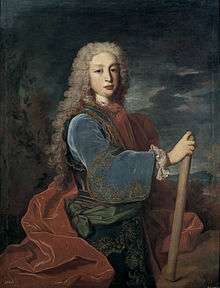 (1724) | |
| José de Grimaldo y Gutiérrez de Solórzano Marquis of Grimaldo (2nd time) |
4 September 1724 | 12 December 1725 | King Philip V (1724–1746) | |
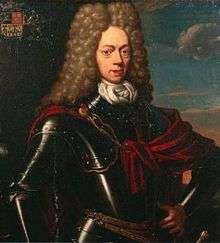 |
Juan Guillermo Ripperdá Duke and Baron of Ripperdá |
12 December 1725 | 14 April 1726 | |
_Pillars_of_Hercules_Variant.svg.png) |
José de Grimaldo y Gutiérrez de Solórzano Marquis of Grimaldo (3rd time) |
14 April 1726 | 1 October 1726 | |
| Juan Bautista de Orendáin y Azpilicueta Marquis of La Paz (2nd time) |
1 October 1726 | 21 November 1734 |
First Secretaries of State
| Picture | Name | From | Until | Monarch (Reign) |
|---|---|---|---|---|
 |
José de Patiño y Rosales | 21 November 1734 | 3 November 1736 | King Philip V (1724–1746) |
 |
Sebastián de la Cuadra y Llerena 1st Marquis of Villarías |
26 November 1736 | 4 December 1746 | |
 |
José de Carvajal y Lancaster | 4 December 1746 | 9 April 1754 | King Ferdinand VI (1746–1759) |
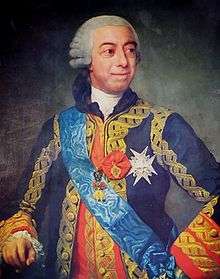 |
Fernando de Silva Mendoza y Toledo Duke of Huéscar |
9 April 1754 | 15 May 1754 | |
 |
Ricardo Wall y Devreux | 15 May 1754 | 10 August 1759 | |
| 10 August 1759 | 9 October 1763 | King Charles III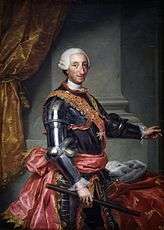 (1759–1788) | ||
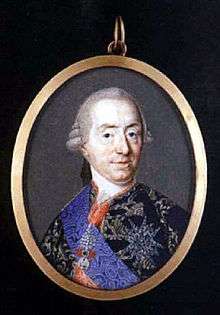 |
Pablo Jerónimo de Grimaldi y Pallavicini Duke of Grimaldi |
9 October 1763 | 19 February 1777 | |
 |
José Moñino y Redondo Count of Floridablanca |
19 February 1777 | 14 December 1788 | |
| 14 December 1788 | 28 February 1792 | King Charles IV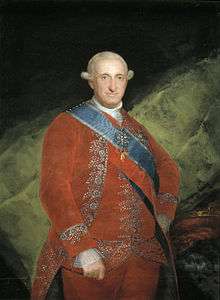 (1788–1808) | ||
 |
Pedro Pablo Abarca de Bolea y Ximénez de Urrea Count of Aranda Acting First Secretary of State |
28 February 1792 | 15 November 1792 | |
.jpg) |
Manuel de Godoy y Álvarez de Faria Duke of Alcudia |
15 November 1792 | 28 March 1798 | |
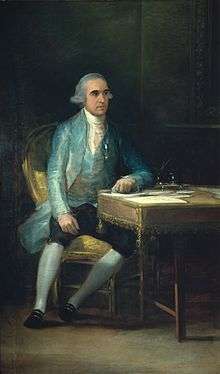 |
Francisco Saavedra de Sangronis Acting First Secretary of State until 6 September 1798 |
30 March 1798 | 21 February 1799 | |
_Pillars_of_Hercules_Variant.svg.png) |
Mariano Luis de Urquijo y Muga Acting First Secretary of State |
12 February 1799 | 13 December 1799 | |
| Pedro Cevallos Guerra (1st time) |
13 December 1799 | 3 March 1808 | ||
| Gonzalo O'Farrill y Herrera Acting First Secretary of State |
3 March 1808 | 19 March 1808 | ||
| Pedro Cevallos Guerra (2nd time) |
19 March 1808 | 7 July 1808 | King Ferdinand VII_by_Goya.jpg) (1808) | |
| Mariano Luis de Urquijo y Muga (2nd time) |
7 July 1808 | 27 June 1813 | King Joseph I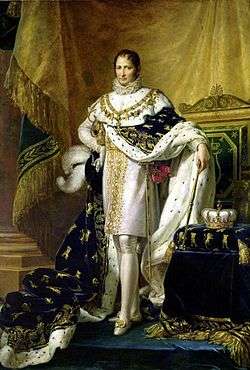 (1808–1813) | |
 |
Juan O'Donoju O'Ryan Acting First Secretary of State |
10 October 1813 | 17 October 1813 | |
_Pillars_of_Hercules_Variant.svg.png) |
Fernando de Laserna Acting First Secretary of State |
17 October 1813 | 3 December 1813 | |
| José Luyando Acting First Secretary of State |
3 December 1813 | 4 May 1814 | King Ferdinand VII_by_Goya.jpg) (1813–1833) | |
 |
José Miguel de Carvajal-Vargas y Manrique de Lara Duke of San Carlos |
4 May 1814 | 15 November 1814 | |
_Pillars_of_Hercules_Variant.svg.png) |
Pedro Cevallos Guerra (3rd time) |
15 November 1814 | 24 January 1816 | |
| Juan Esteban Lozano de Torres | 24 January 1816 | 26 January 1816 | ||
| Pedro Cevallos Guerra (4th time) |
26 January 1816 | 30 October 1816 | ||
| José García de León y Pizarro | 30 October 1816 | 14 September 1818 | ||
 |
Carlos Martínez de Irujo y Tacón Marquis of Casa Irujo Acting First Secretary of State |
14 September 1818 | 12 June 1819 | |
_Pillars_of_Hercules_Variant.svg.png) |
Manuel González Salmón y Gómez de Torres Acting First Secretary of State |
12 June 1819 | 12 September 1819 | |
| Joaquín José Melgarejo y Saurín Duke of San Fernando de Quiroga |
12 September 1819 | 18 March 1820 | ||
| Juan Jabat Aztal Acting First Secretary of State |
18 March 1820 | |||
 |
Evaristo Pérez de Castro y Brito | 18 March 1820 | 2 March 1821 | |
_Pillars_of_Hercules_Variant.svg.png) |
Joaquín Anduaga Cuenca Acting First Secretary of State |
2 March 1821 | 23 April 1821 | |
| Francisco de Paula Escudero Acting First Secretary of State |
23 April 1821 | |||
| Eusebio Bardají y Azara | 23 April 1821 | 8 January 1822 | ||
| Ramón López Pelegrín Acting First Secretary of State |
8 January 1822 | 24 January 1822 | ||
| José Gabriel de Silva y Bazán Marquis of Santa Cruz |
24 January 1822 | 30 January 1822 | ||
| Ramón López Pelegrín Acting First Secretary of State |
30 January 1822 | 28 February 1822 | ||
 |
Francisco Martínez de la Rosa | 28 February 1822 | 5 August 1822 | |
_Pillars_of_Hercules_Variant.svg.png) |
Evaristo Fernández San Miguel y Valledor Acting First Secretary of State from 28 February 1822 |
5 August 1822 | 25 April 1823 | |
| José Manuel Vadillo Acting First Secretary of State |
25 April 1823 | 7 May 1823 | ||
| Santiago Usoz y Mozi Acting First Secretary of State |
7 May 1823 | 13 May 1823 | ||
| José María Pando de la Riva y Ramírez de Laredo | 13 May 1823 | 29 August 1823 | ||
| Luis María de Salazar y Salazar Acting First Secretary of State |
29 August 1823 | 4 September 1823 | ||
| Juan Antonio Yandiola Garay Acting First Secretary of State |
4 September 1823 | 6 September 1823 | ||
| José Luyando (2nd time) |
6 September 1823 | 1 October 1823 | ||
| Víctor Damián Sáez y Sánchez-Mayor Acting First Secretary of State until 7 August 1823 (counter-government until 1 October 1823.) |
25 April 1823 | 2 December 1823 | ||
 |
Carlos Martínez de Irujo y Tacón Marquis of Casa Irujo (2nd time) |
2 December 1823 | 18 January 1824 | |
| Narciso Fernández de Heredia y Begines de los Ríos Count of Ofalia |
18 January 1824 | 11 July 1824 | ||
_Pillars_of_Hercules_Variant.svg.png) |
Luis María de Salazar y Salazar Acting First Secretary of State |
11 July 1824 | ||
| Francisco Cea Bermúdez (1st time) |
11 July 1824 | 24 October 1825 | ||
.jpg) |
Pedro Alcantara Álvarez de Toledo y Salm Salm Duke of the Infantado |
24 October 1825 | 19 August 1826 | |
_Pillars_of_Hercules_Variant.svg.png) |
Manuel González Salmón y Gómez de Torres Acting First Secretary of State until 15 October 1830 |
19 August 1826 | 20 January 1832 | |
 |
Francisco Tadeo Calomarde y Arría Acting First Secretary of State |
20 January 1832 | 22 February 1832 | |
_Pillars_of_Hercules_Variant.svg.png) |
Antonio de Saavedra y Frígola, conde de Alcudia Acting First Secretary of State |
22 February 1832 | 1 October 1832 | |
| José Cafranga Costilla Acting First Secretary of State |
1 October 1832 | 29 November 1832 | ||
| Francisco Cea Bermúdez (2nd time) |
29 November 1832 | 15 January 1834 | ||
Prime Ministers (Presidents of the Council of Ministers)
Political Persuasion: Moderate Progressive Liberal Union Radical Democratic
| Portrait | Name | Term of office | Political Party | Government | Monarch (Reign) | ||
|---|---|---|---|---|---|---|---|
 |
Francisco de Paula Martínez de la Rosa y Berdejo | 15 January 1834 | 7 June 1835 | Moderate Royalist | Martínez de la Rosa | Queen Dowager Maria Christina Regent for Queen Isabella II  (1833–1840) | |
.jpg) |
José María Queipo de Llano Ruiz de Saravia, 7th Count of Toreno | 7 June 1835 | 14 September 1835 | Toreno | |||
 |
Miguel Ricardo de Álava y Esquivel (rejected his nomination, staying as the Spanish ambassador in London.) |
14 September 1835 | 25 September 1835 | Progressive | Álava | ||
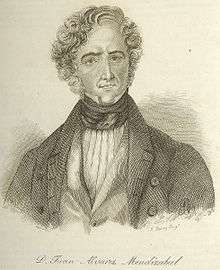 |
Juan Álvarez Mendizábal | 25 September 1835 | 15 May 1836 | Mendizábal | |||
 |
Francisco Javier Isturiz y Montero (1st time) |
15 May 1836 | 14 August 1836 | Moderate | Isturiz I | ||
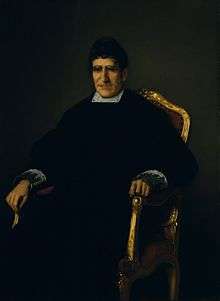 |
José María Calatrava y Peinado | 14 August 1836 | 18 August 1837 | Progressive | Calatrava | ||
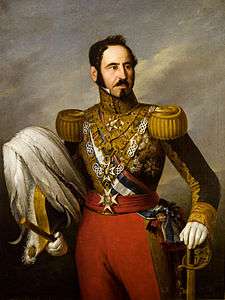 |
Baldomero Espartero, Count of Luchana (1st time) |
18 August 1837 | 18 October 1837 | Espartero I | |||
_Pillars_of_Hercules_Variant.svg.png) |
Eusebio Bardají y Azara | 18 October 1837 | 16 December 1837 | Moderate | Bardají | ||
| Narciso de Heredia y Begines de los Ríos, Count of Ofalia | 16 December 1837 | 6 September 1838 | Heredia | ||||
| Bernardino Fernández de Velasco, 14th Duke of Frías | 6 September 1838 | 9 December 1838 | Frías | ||||
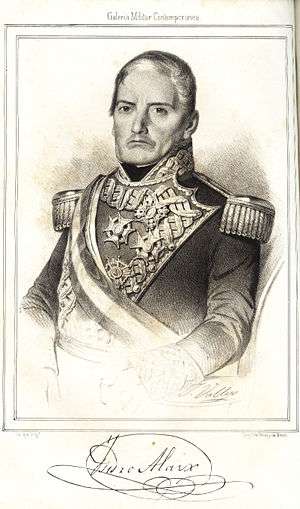 |
Isidro de Alaix Fábregas Acting Prime Minister |
9 December 1838 | 3 February 1839 | — | |||
 |
Evaristo Pérez de Castro y Brito | (9 December 1838) 3 February 1839 |
18 July 1840 | Pérez de Castro | |||
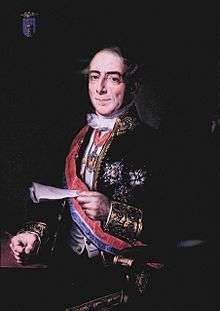 |
Antonio González y González (1st time) |
20 July 1840 | 12 August 1840 | Progressive | González I | ||
| Valentín Ferraz y Barrau | 12 August 1840 | 28 August 1840 | Ferraz | ||||
_Pillars_of_Hercules_Variant.svg.png) |
Modesto Cortázar Acting Prime Minister |
29 August 1840 | 11 September 1840 | — | |||
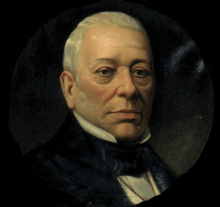 |
Vicente Sancho y Cobertores | 11 September 1840 | 16 September 1840 | Sancho | |||
 |
Baldomero Espartero, Duke of la Victoria (2nd time) |
16 September 1840 | 10 May 1841 | Progressive | Espartero II | Baldomero Espartero Regent for Queen Isabella II  (1840–1843) | |
 |
Joaquín María de Ferrer y Cafranga | 10 May 1841 | 20 May 1841 | Ferrer | |||
 |
Antonio González y González (2nd time) |
20 May 1841 | 17 June 1842 | González II | |||
.jpg) |
José Ramón Rodil y Campillo, Marquis of Rodil | 17 June 1842 | 9 May 1843 | Rodil | |||
 |
Joaquín María López y López (1st time) |
9 May 1843 | 19 May 1843 | López I | |||
.jpg) |
Álvaro Gómez Becerra | 19 May 1843 | 23 July 1843 | Gómez Becerra | |||
 |
Joaquín María López y López (2nd time) |
23 July 1843 | 20 November 1843 | López II | Queen Isabella II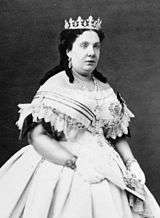 (1833/1843–1868) | ||
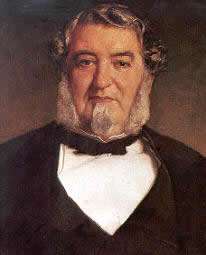 |
Salustiano de Olózaga y Almandoz | 20 November 1843 | 5 December 1843 | Olózaga | |||
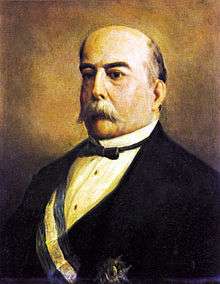 |
Luis González-Bravo y López de Arjona (1st time) |
5 December 1843 | 3 May 1844 | Moderate | González-Bravo | ||
 |
Ramón María Narváez, 1st Duke of Valencia (1st time) |
3 May 1844 | 12 February 1846 | Moderate | Década Moderada | ||
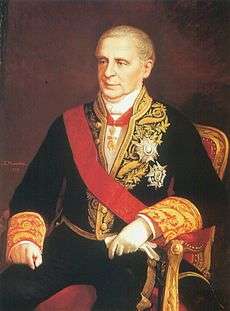 |
Manuel de Pando, 6th Marquis of Miraflores (1st time) |
12 February 1846 | 16 March 1846 | ||||
 |
Ramón María Narváez, 1st Duke of Valencia (2nd time) |
16 March 1846 | 5 April 1846 | ||||
 |
Francisco Javier Isturiz y Montero (2nd time) |
5 April 1846 | 28 January 1847 | ||||
 |
Carlos Martínez de Irujo Marquis of Casa Irujo, Duke of Sotomayor |
28 January 1847 | 28 March 1847 | ||||
 |
Joaquín Francisco Pacheco y Gutiérrez Calderón | 28 March 1847 | 31 August 1847 | ||||
 |
José de Salamanca y Mayol | 31 August 1847 | 12 September 1847 | ||||
_Pillars_of_Hercules_Variant.svg.png) |
Florencio García Goyena | 12 September 1847 | 4 October 1847 | ||||
 |
Ramón María Narváez, 1st Duke of Valencia (3rd time) |
4 October 1847 | 19 October 1849 | ||||
| Serafín María de Sotto, 3rd Count of Clonard (appointment revoked before he could take office.) |
19 October 1849 | 20 October 1849 | |||||
 |
Ramón María Narváez, 1st Duke of Valencia (4th time) |
20 October 1849 | 14 January 1851 | ||||
 |
Juan Bravo Murillo | 14 January 1851 | 14 December 1852 | ||||
| Federico de Roncali, 1st Count of Alcoy | 14 December 1852 | 14 April 1853 | |||||
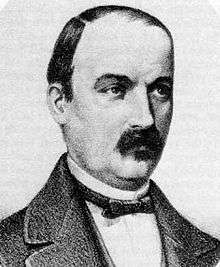 |
Francisco de Lersundi y Hormaechea | 14 April 1853 | 19 September 1853 | ||||
 |
Luis José Sartorius, 1st Count of San Luis | 19 September 1853 | 17 July 1854 | ||||
 |
Fernando Fernández de Córdova | 17 July 1854 | 18 July 1854 | ||||
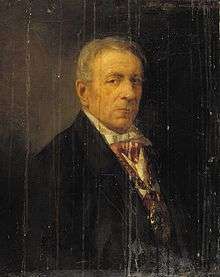 |
Ángel de Saavedra, 3rd Duke of Rivas | 18 July 1854 | 19 July 1854 | ||||
 |
Baldomero Espartero, Duke of la Victoria (3rd time) |
19 July 1854 | 14 July 1856 | Progressive | Bienio progresista | ||
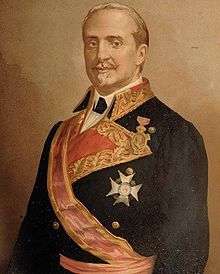 |
Leopoldo O'Donnell y Jorris (1st time) |
14 July 1856 | 12 October 1856 | Liberal Union | O'Donnell I | ||
 |
Ramón María Narváez, 1st Duke of Valencia (5th time) |
12 October 1856 | 15 October 1857 | Moderate | Narváez V | ||
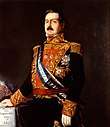 |
Francisco Armero y Peñaranda, 1st Marquis of Nervión | 15 October 1857 | 14 January 1858 | Nervión | |||
 |
Francisco Javier Isturiz y Montero (3rd time) |
14 January 1858 | 30 June 1858 | Isturiz III | |||
 |
Leopoldo O'Donnell y Jorris (2nd time) |
30 June 1858 | 2 March 1863 | Liberal Union | O'Donnell II O'Donnell III | ||
 |
Manuel de Pando, 6th Marquis of Miraflores (2nd time) |
2 March 1863 | 17 January 1864 | Moderate | Miraflores II | ||
 |
Lorenzo Arrazola y García | 17 January 1864 | 1 March 1864 | Arrazola | |||
 |
Alejandro Mon y Menéndez | 1 March 1864 | 16 September 1864 | Moderate | Mon | ||
 |
Ramón María Narváez, 1st Duke of Valencia (6th time) |
16 September 1864 | 21 June 1865 | Moderate | Narváez VI | ||
 |
Leopoldo O'Donnell y Jorris (3rd time) |
21 June 1865 | 10 July 1866 | Liberal Union | O'Donnell IV | ||
 |
Ramón María Narváez, 1st Duke of Valencia (7th time) |
10 July 1866 | 23 April 1868 | Moderate | Narváez VII | ||
 |
Luis González-Bravo y López de Arjona (2nd time) |
23 April 1868 | 19 September 1868 | Moderate | González-Bravo II | ||
 |
José Gutiérrez de la Concha, 1st Marquis of Havana | 19 September 1868 | 30 September 1868 | Moderate | Havana | ||
 |
Pascual Madoz Ibáñez Acting Prime Minister |
30 September 1868 | 3 October 1868 | Progressive | — | No formal Head of State | |
 |
Francisco Serrano y Domínguez, 1st Duke of La Torre (1st time) |
3 October 1868 | 18 June 1869 | Liberal Union | Serrano I | ||
 |
General Juan Prim y Prats, 1st Marquis of Los Castillejos | 18 June 1869 | 27 December 1870 (assassinated: died 30 December 1870) |
Progressist Liberal | Prim | Regent Francisco Serrano y Domínguez (1869–1870) | |
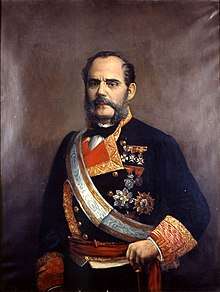 |
Juan Bautista Topete y Carballo Acting Prime Minister |
27 December 1870 | 4 January 1871 | Liberal Union | — | King Amadeo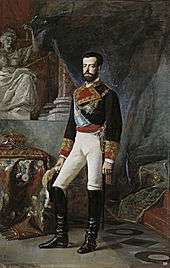 (1870–1873) | |
 |
Francisco Serrano y Domínguez, 1st Duke of La Torre (2nd time) |
4 January 1871 | 24 July 1871 | Serrano II | |||
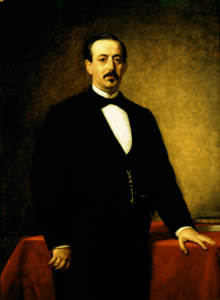 |
Manuel Ruiz Zorrilla (1st time) |
24 July 1871 | 5 October 1871 | Radical Democratic Party | Ruiz Zorrilla I | ||
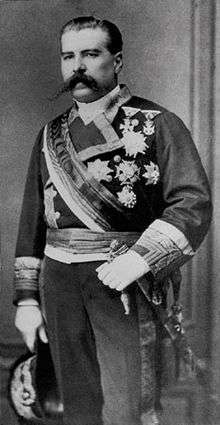 |
José Malcampo y Monge, 3rd Marquis of San Rafael | 5 October 1871 | 21 December 1871 | Democratic | Malcampo | ||
.jpg) |
Práxedes Mateo Sagasta (1st time) |
21 December 1871 | 26 May 1872 | Progressist Liberal | Sagasta I | ||
 |
Juan Bautista Topete y Carballo Acting Prime Minister |
26 May 1872 | 4 June 1872 | Liberal Union | — | ||
 |
Francisco Serrano y Domínguez, 1st Duke of La Torre (3rd time) |
4 June 1872 | 13 June 1872 | Serrano III | |||
 |
Fernando Fernández de Córdova, 2nd Marquis of Mendigorría Acting Prime Minister |
13 June 1872 | 16 June 1872 | Radical Democratic Party | — | ||
 |
Manuel Ruiz Zorrilla (2nd time) |
16 June 1872 | 12 February 1873 | Radical Democratic Party | Ruiz Zorrilla II | ||
List of officeholders
| Federal Republican Constitutional | |||||||||
|---|---|---|---|---|---|---|---|---|---|
| Portrait | Name (Birth–Death) |
Term of office Electoral mandates |
Days (Years and days) |
Other ministerial offices held whilst Prime Minister |
Political party | Government | President (Term) | ||
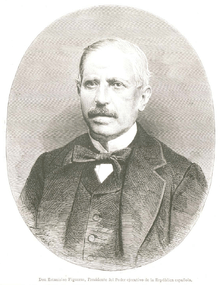 |
The Most Excellent Estanislao Figueras (1819–1882) |
12 February 1873 |
11 June 1873 |
119 days | – Minister of War from 1873 | Federal Republican | Figueras I | Himself | |
| Figueras II | |||||||||
| Figueras III | |||||||||
| Figueras IV | |||||||||
| 1873 | |||||||||
| Antonio Dorregaray's military uprising; Cristino Martos' coup d'etat attempts in February and April; slavery in Puerto Rico abolished; federal republic proclaimed. Allegedly fed up with parliamentary and governmental deadlock in the political, economic and social situation of the country, he left the country and went into exile during the night. | |||||||||
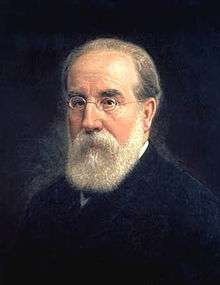 |
The Most Excellent Francesc Pi i Margall (1824–1901) |
11 June 1873 |
18 July 1873 |
37 days | – Minister of Governance | Federal Republican | Pi y Margall | Himself | |
| — | |||||||||
| 1873 oil rebellion; Cartagena canton proclaimed, start of the Cantonal rebellion; Spanish Draft Constitution of 1873. Third Carlist War: Carlos VII advances into the Basque provinces. | |||||||||
 |
The Most Excellent Nicolás Salmerón (1838–1908) |
18 July 1873 |
7 September 1873 |
51 days | — | Federal Republican | Salmerón | Himself | |
| — | |||||||||
| Cantonal rebellion: cantonal ships declared as pirates; Provisional Government of the Spanish Federation created by the Cartagena canton; Battle of Chinchilla; start of Siege of Cartagena. Resigned after refusing to sign the death sentences of soldiers tried for collaborating with cantonalists. | |||||||||
 |
The Most Excellent Emilio Castelar (1832–1899) |
7 September 1873 |
3 January 1874 |
118 days | — | Federal Republican unitary republican |
Castelar | Himself | |
| — | |||||||||
 |
The Most Excellent Francisco Serrano, 1st Duke of la Torre (1810–1885) |
3 January 1874 |
26 February 1874 |
54 days | — | Constitutional conservative wing |
Serrano V | Himself | |
| — | |||||||||
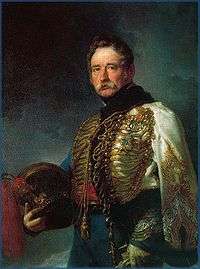 |
The Most Excellent Juan Zavala y de la Puente, 1st Marquess of Sierra Bullones (1804–1879) |
26 February 1874 |
3 September 1874 |
189 days | – Minister of War | Constitutional conservative wing |
Zavala I | Francisco Serrano (1874) | |
| Zavala II | |||||||||
| — | |||||||||
 |
The Most Excellent Práxedes Mateo Sagasta (1825–1903) |
3 September 1874 |
31 December 1874 |
119 days | – Minister of Governance | Constitutional progressive wing |
Sagasta III | ||
| Sagasta IV | |||||||||
| — | |||||||||
| Conservative Liberal Fusionist/Liberal Dynastic Left Conservative Union Liberal Democrats Maurist Military Patriotic Union Monarchists | |||||||||
| Portrait | Name (Birth–Death) |
Term of office Electoral mandates |
Days (Years and days) |
Other ministerial offices held whilst Prime Minister |
Political party | Government | Monarch (Reign) | ||
| |
The Most Excellent Antonio Cánovas del Castillo (1828–1897) |
31 December 1874 |
12 September 1875 |
255 days | – President of the Ministry-Regency until 1875 – Minister of the Navy during 1875 |
Conservative | Cánovas I | Alfonso XII (1874–1885) | |
| — | |||||||||
| President of the Ministry-Regency until King Alfonso XII's return from exile; return of ecclesiastical goods; closure of several opposition newspapers; re-incorporation of military officers expelled during the revolutionary period. | |||||||||
 |
The Most Excellent Joaquín Jovellar (1819–1892) |
12 September 1875 |
2 December 1875 |
81 days | – Minister of War | Conservative | Jovellar | ||
| — | |||||||||
| Named to the post to organize the 1876 Constituent Cortes election. | |||||||||
| |
The Most Excellent Antonio Cánovas del Castillo (1828–1897) |
2 December 1875 |
7 March 1879 |
3 years, 94 days | — | Conservative | Cánovas II | ||
| 1876 | |||||||||
| End of Third Carlist War; Spanish Constitution of 1876 adopted; abolition of the fueros in the Vascongadas and Navarre; German–Spanish secret agreement for military cooperation; Pact of Zanjón ending Ten Years' War; Alfonso XII married to Mercedes of Orléans, who would die later that year of typhoid fever; 1878 pro-Republican protest in Navalmoral de la Mata; electoral law introducing census suffrage; unsuccessful 1878 assassination attempt on Alfonso XII. | |||||||||
 |
The Most Excellent Arsenio Martínez Campos (1831–1900) |
7 March 1879 |
9 December 1879 |
277 days | – Minister of War | Conservative | Martínez Campos | ||
| 1879 | |||||||||
| Reforms in Cuba resulting from the Pact of Zanjón; outbreak of Little War; Print Law 1979; Alfonso XII married to Maria Christina of Austria. | |||||||||
| |
The Most Excellent Antonio Cánovas del Castillo (1828–1897) |
9 December 1879 |
8 February 1881 |
1 year, 61 days | – Minister of State during 1880 | Conservative | Cánovas III | ||
| — | |||||||||
| Slavery in Cuba abolished; end of Little War; unsuccessful 1879 assassination attempt on Alfonso XII and Maria Christina of Austria; Madrid Conference of 1880; issue of mortgage notes from the Treasury of the island of Cuba; Public Meetings Law 1880; Civil Procedure Law 1881. Resigned after the King refused to sign the Debt Conversion Law 1881. | |||||||||
.jpg) |
The Most Excellent Práxedes Mateo Sagasta (1825–1903) |
8 February 1881 |
13 October 1883 |
2 years, 247 days | — | Liberal Fusionist | Sagasta V | ||
| 1881 | |||||||||
| First turno Prime Minister. María de las Mercedes becomes Princess of Asturias; Catalan industrialists proters over 1880 Franco–Spanish commercial agreement; progresses in press freedom and labour movement claims; Criminal Procedure Law 1882; commercial agreements with the German and British Empires. The 1883 pro-Republican protests in Badajoz, Santo Domingo de la Calzada and Seo de Urgel, the Paris Incident during Alfonso XII state visit and political pressure from the Dynastic Left led to his resignation. | |||||||||
 |
The Most Excellent José Posada Herrera (1814–1885) |
13 October 1883 |
18 January 1884 |
97 days | — | Dynastic Left | Posada Herrera | ||
| — | |||||||||
| Previously President of the Congress of Deputies in 1876–78 and from 1881. Reform of Public Instruction Law; use of shackles abolished in Cuba; creation of Social Reform Commission. Resigned after his rivalry with Sagasta resulted in the loss of a parliamentary vote on the implantation of universal suffrage. | |||||||||
| |
The Most Excellent Antonio Cánovas del Castillo (1828–1897) |
18 January 1884 |
27 November 1885 |
1 year, 313 days | — | Conservative | Cánovas IV | ||
| 1884 | |||||||||
| Spanish annexation of Río de Oro; 1885 cholera pandemic; crackdown on pro-Republican protests supporters; 1885 Commercial Code; start of Caroline Crisis; Madrid Protocol of 1885; Pact of El Pardo. Death of King Alfonso XII on 25 November 1885. | |||||||||
.jpg) |
The Most Excellent Práxedes Mateo Sagasta (1825–1903) |
27 November 1885 |
5 July 1890 |
4 years, 220 days | — | Liberal | Sagasta VI | Maria Christina (1886–1902) Regent for Alfonso XIII | |
| Sagasta VII | |||||||||
| Sagasta VIII | |||||||||
| Sagasta IX | |||||||||
| 1886 | |||||||||
| Longest Restoration term (Long Parliament). End of Caroline Crisis through the arbitration of Pope Leo XIII; birth of King Alfonso XIII on 17 May 1886; abolition of patronage in Cuba; Associations Law 1887 and legalization of trade unions; 1887 Mediterranean Agreements; Cassola's military service reform to end redemptions; Jurisdiction Law 1888; 1888 Barcelona Universal Exposition; 1889 Civil Code; 1890 electoral law introducing universal manhood suffrage. | |||||||||
| |
The Most Excellent Antonio Cánovas del Castillo (1828–1897) |
5 July 1890 |
11 December 1892 |
2 years, 159 days | – Minister of the Navy during 1890–1891 | Conservative | Cánovas V | ||
| Cánovas VI | |||||||||
| 1891 | |||||||||
| 1890–92 Phylloxera Blight; Weyler's campaign in Mindanao; introduction of 1891 Cánovas Tariff and move of economic policy towards protectionism; Amnesty Law por political offences; 1892 Jerez Insurrection; Plaza Real bombing; surge of Catalan nationalism (Manresa Bases 1892). Resigned after a corruption scandal in the City Council of Madrid prompted a rebellion within his party led by Francisco Silvela. | |||||||||
.jpg) |
The Most Excellent Práxedes Mateo Sagasta (1825–1903) |
11 December 1892 |
23 March 1895 |
2 years, 102 days | — | Liberal | Sagasta X | ||
| Sagasta XI | |||||||||
| Sagasta XII | |||||||||
| 1893 | |||||||||
| Margallo War; Buenaventura Abarzuza's autonomy plan for the Philippines; unsuccessful administrative decentralization plan for Cuba and Puerto Rico; unsuccessful 1893 assassination attempt on General Martínez Campos; Liceu Bomb. The start of the Cuban War of Independence led to Sagasta's government downfall. | |||||||||
| |
The Most Excellent Antonio Cánovas del Castillo (1828–1897) |
23 March 1895 |
8 August 1897† |
2 years, 138 days | — | Conservative | Cánovas VII | ||
| 1896 | |||||||||
| Rise of Basque nationalism (PNV founded); 1896 Corpus procession bombing; start of Philippine Revolution. †Assassinated by Italian anarchist Michele Angiolillo. | |||||||||
 |
The Most Excellent Marcelo Azcárraga (1832–1915) |
8 August 1897 |
21 August 1897 |
57 days | – Minister of War | Conservative | (acting) | ||
| 21 August 1897 |
4 October 1897 |
Azcárraga I | |||||||
| — | |||||||||
| Served as Minister of War under Cánovas and as acting Prime Minister following his assassination. He was appointed officeholder on 21 August 1897, before giving way to a new Sagasta government in October 1897. | |||||||||
.jpg) |
The Most Excellent Práxedes Mateo Sagasta (1825–1903) |
4 October 1897 |
4 March 1899 |
1 year, 151 days | – Minister of Development during 1898–1899 | Liberal | Sagasta XIII | ||
| Sagasta XIV | |||||||||
| 1898 | |||||||||
| Approval of 1897 Autonomy Charts for Cuba and Puerto Rico; Pact of Biak-na-Bato; Sinking of USS Maine leading the US to declare war on Spain, starting the Spanish–American War; 1898 Treaty of Paris resulting in the loss of Cuba, Puerto Rico, Guam and the Philippines. | |||||||||
.jpg) |
The Most Excellent Francisco Silvela (1843–1905) |
4 March 1899 |
23 October 1900 |
1 year, 233 days | – Minister of State until 1900 – Minister of the Navy from 1900 |
Conservative Union | Silvela I | ||
| Silvela II | |||||||||
| 1899 | |||||||||
| 1899 German–Spanish Treaty, under which the Caroline Islands and the Northern Mariana Islands were sold to Germany; Silvela–Polavieja agreement for regenerationist reform; Overseas Ministry disestablished; policial crisis over the Princess of Asturias' engagement to Carlos of Bourbon; Fernández Villaverde's tax reform; 1899 taxpayer strike in Barcelona (tancament de caixes); Work Accidents Law 1900; Ministry of Public Instruction established. Silvela's government fell as a result of party division over budgetary balance. | |||||||||
 |
The Most Excellent Marcelo Azcárraga (1832–1915) |
23 October 1900 |
6 March 1901 |
134 days | – Minister of the Navy until 1900 | Conservative | Azcárraga II | ||
| — | |||||||||
| Princess of Asturias' marriage with Carlos of Bourbon and subsequent protests; Carlist uprisings in some areas of Catalonia, Valencia and Alicante. | |||||||||
.jpg) |
The Most Excellent Práxedes Mateo Sagasta (1825–1903) |
6 March 1901 |
6 December 1902 |
1 year, 275 days | — | Liberal | Sagasta XV | ||
| Sagasta XVI | |||||||||
| Sagasta XVII | Alfonso XIII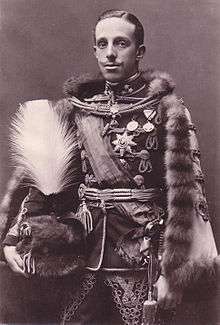 (1886/1902–1931) | ||||||||
| Sagasta XVIII | |||||||||
| 1901 | |||||||||
| 1901 anti-clerical protests and Royal Decree on Religious Associations; University Autonomy Law 1901; creation of Institute for Work; Alfonso XIII comes of age on 17 May 1902, end of Maria Christina's regency. Resigned due to ill health; died one month after leaving office. | |||||||||
.jpg) |
The Most Excellent Francisco Silvela (1843–1905) |
6 December 1902 |
20 July 1903 |
226 days | — | Conservative | Silvela III | ||
| 1903 | |||||||||
| The resignation of Raimundo Fernández Villaverde as Minister of Finance on 26 March 1903 weakened Silvela's government; student protests resulting in the death of two students in Salamanca. Tired, Silvela resigned from all his offices and retired from politics. | |||||||||
 |
The Most Excellent Raimundo Fernández Villaverde (1848–1905) |
20 July 1903 |
5 December 1903 |
138 days | — | Conservative | Villaverde I | ||
| — | |||||||||
| Previously President of the Congress of Deputies in 1900–01 and from 1903. Labor conflicts led to a general strike which in Biscay obliged to declare the "state of war". | |||||||||
.jpg) |
The Most Excellent Antonio Maura (1853–1925) |
5 December 1903 |
16 December 1904 |
1 year, 11 days | — | Conservative | Maura I | ||
| — | |||||||||
| Nozaleda issue; Law on Sunday Rest; 1904 assassination attempt; Spain–Holy See Agreements of 1904; creation of Army Staff. Government crisis over King Alfonso XIII pressures for General Camilo García de Polavieja to become new Chief of the Army Staff ahead of the government's candidate Francisco de Paula Loño y Pérez; resigned shortly afterwards. | |||||||||
 |
The Most Excellent Marcelo Azcárraga (1832–1915) |
16 December 1904 |
27 January 1905 |
42 days | – Minister of the Navy until 1905 | Conservative | Azcárraga III | ||
| — | |||||||||
| Third and final time as Prime Minister. | |||||||||
 |
The Most Excellent Raimundo Fernández Villaverde (1848–1905) |
27 January 1905 |
23 June 1905 |
147 days | Conservative | Villaverde II | |||
| — | |||||||||
| Kept the Cortes closed until June 1905 due to lack of parliamentary support. Resigned after defeats in the Senate (17 June) and Congress (21 June). | |||||||||
 |
The Most Excellent Eugenio Montero Ríos (1832–1914) |
23 June 1905 |
1 December 1905 |
161 days | — | Liberal | Montero Ríos I | ||
| Montero Ríos II | |||||||||
| 1905 | |||||||||
| Unsuccessful 1905 assassination attempt on Alfonso XIII in Paris; ¡Cu-Cut! incident. Resigned after King Alfonso XIII refused to support punishments on the military personnel involved in the attack. | |||||||||
.jpg) |
The Most Excellent Segismundo Moret (1833–1913) |
1 December 1905 |
6 July 1906 |
217 days | — | Liberal | Moret I | ||
| — | |||||||||
| Algeciras Conference; Jurisdiction Law 1906 redirecting all crimes "against the country or the army" to military justice; massive protests in Catalonia against the law and creation of Catalan Solidarity. Resigned after the unsuccessful 1906 assassination attempt on King Alfonso XIII. | |||||||||
 |
The Most Excellent José López Domínguez (1829–1911) |
6 July 1906 |
30 November 1906 |
147 days | – Minister of War until 1906 | Liberal | López Dominguez | ||
| — | |||||||||
| The Papelito crisis caused by Segismundo Moret led to the government's downfall. | |||||||||
.jpg) |
The Most Excellent Segismundo Moret (1833–1913) |
30 November 1906 |
4 December 1906 |
4 days | — | Liberal | Moret II | ||
| — | |||||||||
| Papelito crisis leading to Moret lacking the necessary support to govern. Resigned before a successful vote of no confidence in the Senate was enforced. | |||||||||
 |
The Most Excellent Antonio Aguilar y Correa, 8th Marquess of la Vega de Armijo (1824–1908) |
4 December 1906 |
25 January 1907 |
52 days | — | Liberal | Aguilar y Correa | ||
| — | |||||||||
| Previously President of the Congress of Deputies in 1893–95, 1898–99, 1901, 1902–03 and from 1905. His brief tenure was limited to having the 1907 budget passed. The crisis within the Liberal Party led the King to dismiss them from the government. | |||||||||
.jpg) |
The Most Excellent Antonio Maura (1853–1925) |
25 January 1907 |
21 October 1909 |
2 years, 269 days | — | Conservative | Maura II (Long Government) | ||
| 1907 | |||||||||
| "Revolution from above". 1907 electoral law, introducing automatic election for candidates running unopposed; Pact of Cartagena; creation of National Insurance Institute; Local Administration and Terrorism Suppression Laws not approved; Hispano-French Exposition of 1908; Second Melillan Campaign and Lobo Canyon Disaster; 1909 Tragic Week in Barcelona. After public outrage over the execution of Francisco Ferrer, King Alfonso XIII withdrew his support from Maura's government, leading to his downfall. | |||||||||
.jpg) |
The Most Excellent Segismundo Moret (1833–1913) |
21 October 1909 |
9 February 1910 |
111 days | – Minister of Governance | Liberal | Moret III | ||
| — | |||||||||
| His approachment to Alejandro Lerroux's republicans and Melquíades Álvarez's reformists led to a crisis within the Liberals and cost him the support of the King. Resigned after Alfonso XIII refused to sign Moret's decree of dissolution of the Cortes. | |||||||||
.jpg) |
The Most Excellent José Canalejas (1854–1912) |
9 February 1910 |
12 November 1912† |
2 years, 277 days | – Minister of Grace and Justice during 1911–1912 | Liberal | Canalejas I | ||
| Canalejas II | |||||||||
| Canalejas III | |||||||||
| 1910 | |||||||||
| Previously President of the Congress of Deputies in 1906–07. 1910–12 restriction of religious congregation establishments (Padlock Law); prohibition of night work for women; Crime of Cuenca; Law of chair recognising women the right to a seat during worktime; industrial courts reform; Third Melillan campaign; Establishment of compulsory military service; 1912 railway strike; draft for Catalan Management Community. †Assassinated by Spanish anarchist Manuel Pardiñas. | |||||||||
.jpg) |
The Most Excellent Manuel García Prieto, 1st Marquess of Alhucemas (1859–1938) Acting Prime Minister |
12 November 1912 |
14 November 1912 |
2 days | – Minister of State | Liberal | (acting) | ||
| — | |||||||||
| Served as Minister of State under Canalejas and as acting Prime Minister following his assassination. | |||||||||
 |
The Most Excellent Álvaro Figueroa y Torres, 1st Count of Romanones (1863–1950) |
14 November 1912 |
27 October 1913 |
347 days | – Minister of Grace and Justice during 1913 | Liberal | Romanones I | ||
| Romanones II | |||||||||
| — | |||||||||
| Previously President of the Congress of Deputies from 1910. Treaty Between France and Spain Regarding Morocco; Spanish protectorate in Morocco established; Jebala tribes uprising in Morocco, led by Ahmed er Raisuni. | |||||||||
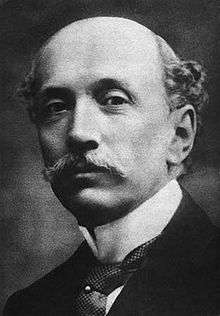 |
The Most Excellent Eduardo Dato (1856–1921) |
27 October 1913 |
9 December 1915 |
2 years, 43 days | – Minister of Grace and Justice during 1914–1915 | Conservative | Dato I | ||
| 1914 | |||||||||
| Previously President of the Congress of Deputies in 1907–10. Establishment of Catalan Management Community; First World War outbreak, with Spain maintaining neutrality; High Commissioner in Morocco José Marina Vega replaced by Francisco Gómez Jordana. | |||||||||
 |
The Most Excellent Álvaro Figueroa y Torres, 1st Count of Romanones (1863–1950) |
9 December 1915 |
19 April 1917 |
1 year, 131 days | – Minister of State during 1916 | Liberal | Romanones III | ||
| 1916 | |||||||||
| Luque y Coca's military reform and creation of the Boards of Defence; Alfonso XIII's refusal to the government's attempted dissolution of the Boards; February Revolution in Russia. U-boat campaign during the War resulting in the sinking of Spanish merchant shipping; his pro-belligerent stance on Germany was unsupported by his allies, leading to his resignation. | |||||||||
.jpg) |
The Most Excellent Manuel García Prieto, 1st Marquess of Alhucemas (1859–1938) |
19 April 1917 |
11 June 1917 |
53 days | — | Liberal Democrats | García Prieto I | ||
| — | |||||||||
| Start of Spanish Crisis of 1917. Resigned after an attempted crack down on the Boards of Defence led to massive military outcry. | |||||||||
 |
The Most Excellent Eduardo Dato (1856–1921) |
11 June 1917 |
3 November 1917 |
145 days | — | Conservative | Dato II | ||
| — | |||||||||
| Spanish Crisis of 1917: Assembly of Parliamentarians and 1917 general strike; outbreak of pistolerismo. Government fell due to pressures from the Boards of Defence. | |||||||||
.jpg) |
The Most Excellent Manuel García Prieto, 1st Marquess of Alhucemas (1859–1938) |
3 November 1917 |
22 March 1918 |
139 days | – Minister of State | Liberal Democrats | García Prieto II (Lib.Dem.–Lib.rom.–Maur.–Cierv. –LRC until 1918) | ||
| — | |||||||||
| Formed national unity government with members from several ideologies (liberal democrats, conservatives and regionalists); October Revolution in Russia; 1918 flu pandemic; de la Cierva's attempt to legislate in favour of the Boards of Defence; 1918 mail strike. | |||||||||
.jpg) |
The Most Excellent Antonio Maura (1853–1925) |
22 March 1918 |
9 November 1918 |
232 days | – Minister of Grace and Justice from 1918 | Maurist | Maura III (National unity) | ||
| 1918§ | |||||||||
| §Hung parliament; formed national unity government. 1918 Law of Bases on the inalienability of the civil servants; riots in several cities against high prices (subsistence problems). | |||||||||
.jpg) |
The Most Excellent Manuel García Prieto, 1st Marquess of Alhucemas (1859–1938) |
9 November 1918 |
5 December 1918 |
26 days | – Minister of Development | Liberal Democrats | García Prieto III | ||
| — | |||||||||
| End of First World War; start of Catalan autonomist campaign of 1918–19. | |||||||||
 |
The Most Excellent Álvaro Figueroa y Torres, 1st Count of Romanones (1863–1950) |
5 December 1918 |
15 April 1919 |
131 days | – Minister of State | Liberal | Romanones IV | ||
| — | |||||||||
| The Bolshevik Three Years in Andalusia; La Canadiense strike; public pension system established; Eight-hour day Decree. | |||||||||
.jpg) |
The Most Excellent Antonio Maura (1853–1925) |
15 April 1919 |
20 July 1919 |
96 days | — | Maurist | Maura IV (Maur.–Cierv.–Lib.) | ||
| — | |||||||||
| Called a general election for June 1919, but failed to win an outright majority. Unrecognized by the Conservatives as their leader, his government fell shortly thereafter. | |||||||||
| |
The Most Excellent Joaquín Sánchez de Toca (1852–1942) |
20 July 1919 |
12 December 1919 |
145 days | — | Conservative | Sánchez de Toca | ||
| 1919§ | |||||||||
| Creation of Sindicatos Libres. Social tensions and pressure from the Boards of Defence led to the government's downfall. | |||||||||
 |
The Most Excellent Manuel Allendesalazar (1856–1923) |
12 December 1919 |
5 May 1920 |
145 days | – Minister of the Navy from 1920 | Conservative | Allendesalazar I (Con.–Lib.) | ||
| — | |||||||||
| League of Nations founded; first newly-approved budget since 1914. | |||||||||
 |
The Most Excellent Eduardo Dato (1856–1921) |
5 May 1920 |
8 March 1921† |
307 days | – Minister of the Navy | Conservative | Dato III | ||
| 1920§ | |||||||||
| Ministry of Labour created; start of Rif War; Severiano Martínez's state terror campaign on trade unionists. †Assassinated by Spanish anarchist Pedro Mateu. | |||||||||
| |
The Most Excellent Gabino Bugallal, 2nd Count of Bugallal (1861–1932) Acting Prime Minister |
8 March 1921 |
13 March 1921 |
5 days | – Minister of Governance | Conservative | (acting) | ||
| — | |||||||||
| Served as Minister of Governance under Dato in 1920–21 and as acting Prime Minister following his assassination. | |||||||||
 |
The Most Excellent Manuel Allendesalazar (1856–1923) |
13 March 1921 |
14 August 1921 |
154 days | — | Conservative | Allendesalazar II | ||
| — | |||||||||
| Disaster of Annual. After losing Conservative support in favour of Maura, his government resigned. | |||||||||
.jpg) |
The Most Excellent Antonio Maura (1853–1925) |
14 August 1921 |
8 March 1922 |
206 days | — | Maurist | Maura V (Con.–Lib.–LRC) | ||
| — | |||||||||
| Rif Republic established. Resigned after refusing to accept the Liberals, Republicans and Socialists' demand to restitute the constitutional guarantees (suspended since 1919). | |||||||||
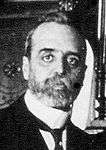 |
The Most Excellent José Sánchez-Guerra (1859–1935) |
8 March 1922 |
7 December 1922 |
274 days | – Minister of War from 1922 | Conservative | Sánchez-Guerra (Con.–LRC) | ||
| — | |||||||||
| Previously President of the Congress of Deputies from 1919. 1922 postal officials strike; crisis over the Picasso report. After opposition parties censured Allendesalazar and Sánchez-Guerra's government during the report's debate in the Congress, he tendered his resignation to the King. | |||||||||
.jpg) |
The Most Excellent Manuel García Prieto, 1st Marquess of Alhucemas (1859–1938) |
7 December 1922 |
15 September 1923 |
282 days | — | Liberal Democrats | García Prieto IV | ||
| 1923 | |||||||||
| Attempted liberal reform of the Restoration system; killing of Archbishop of Barcelona Juan Soldevilla; Primo de Rivera's coup d'etat. | |||||||||
 |
The Most Excellent Miguel Primo de Rivera, 2nd Marquess of Estella (1870–1930) |
15 September 1923 |
3 December 1925 |
6 years, 137 days | – President of the Military Directory until 1925 – Minister of State during 1927–1928 – Minister of Foreign Affairs from 1928 |
Military | Military Directory | ||
| 3 December 1925 |
30 January 1930 |
Patriotic Union | Civil Directory | ||||||
| — | |||||||||
| Establishment of an authoritarian military dictatorship and suppression of the 1876 Constitution. National Somatén Decree; Municipal Statute of 1924; Patriotic Union created; Provincial Statute of 1925; Alhucemas landing and end of the Rif War; 1926 coup d'etat attempt (Sanjuanada); creation of Telefónica, CAMPSA, National Circuit Special Firms and of hydrographic confederations; 1928 Penal Code; 1929 Ibero-American and Barcelona International Expositions; draft Constitution of 1929 (Fundamental Statute of the Monarchy); 1929 coup d'etat attempt; Great Depression. Resigned after growing political and social unrest, mounting economic problems, the withdrawal of support from the King and the Armed Forces and the impending threat of a new coup attempt, ending the dictatorship. Died two months after leaving office. | |||||||||
 |
The Most Excellent Dámaso Berenguer, 1st Count of Xauen (1873–1953) |
30 January 1930 |
18 February 1931 |
1 year, 19 days | – Minister of the Army | Military | Berenguer | ||
| — | |||||||||
| Dictablanda. Government promises to call for elections and restore the Constitution; Pact of San Sebastián; Jaca Uprising. Rejection from political parties to participate in a Restoration-style general election led to his resignation. | |||||||||
 |
The Most Excellent Juan Bautista Aznar-Cabañas (1860–1933) |
18 February 1931 |
14 April 1931 |
55 days | — | Monarchist | Aznar-Cabañas | ||
| — | |||||||||
| Republican victory in the 1931 local elections leading to the government's resignation; the Second Spanish Republic and Provisional Government established; Alfonso XIII flees the country into exile. | |||||||||
| DLR AR PRR Independent IR UR PSOE | |||||||||
| Portrait | Name Honorifics & Constituency (Birth–Death) |
Term of office Electoral mandates |
Days (Years and days) |
Other ministerial offices held whilst Prime Minister |
Political party | Government | President (Term) | ||
 |
The Most Excellent Niceto Alcalá-Zamora (1877–1949) |
14 April 1931 |
14 October 1931 |
183 days | — | DLR | Provisional I (Republican coalition) |
Himself | |
| — | |||||||||
| Statute of the Provisional Government; Francesc Macià proclaims the Catalan Republic within the Iberian Confederation; the Generalitat de Catalunya is re-established; 1931 Burning of Convents and subsequent May Decrees for Church and State Separation in Education; freedom of worship and conscience in schools; Azaña's military reform (Azaña Law); Largo Caballero's Agrarian Decrees; draft Basque–Navarrese Statute (Statute of Estella). | |||||||||
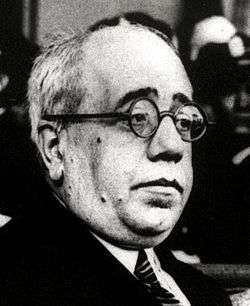 |
The Most Excellent Manuel Azaña (1880–1940) |
14 October 1931 |
16 December 1931 |
63 days | – Minister of War | AR | Provisional II (Azaña I) (Republican coalition) |
Himself | |
| 1931§ | |||||||||
| Defense of the Republic Law 1931; Labor Contracts Law; Mixed Juries Law; Spanish Constitution of 1931 adopted. | |||||||||
 |
The Most Excellent Manuel Azaña (1880–1940) |
16 December 1931 |
12 June 1933 |
1 year, 270 days | – Minister of War | AR | Azaña II (AR–PSOE–PRRS–ERC–ORGA) |
Niceto Alcalá-Zamora (1931–1936) | |
| 12 June 1933 |
12 September 1933 |
Azaña III (AR–PSOE–PRRS–ERC–ORGA–PRDF) | |||||||
| — | |||||||||
| Reformist Biennium. 1932 Catalonia Statute of Autonomy; Divorce Law 1932; 1932 coup d'état attempt (La Sanjurjada); Agrarian Reform Law 1932; Income Tax introduced; January 1933 anarchist uprising and Casas Viejas incident; Public Order Law 1933; Confessions and Religious Congregations Law 1933; creation of Constitutional Guarantees Court; introduction of women's suffrage. President Niceto Alcalá-Zamora withdrew his support from the government after an unsuccessful vote of no confidence, causing its downfall. | |||||||||
 |
The Most Excellent Alejandro Lerroux (1864–1949) |
12 September 1933 |
9 October 1933 |
27 days | — | PRR | Lerroux I (PRR–PRRS–IRS–ERC–AR–ORGA) | ||
| — | |||||||||
| Named to the post after Azaña's resignation. Resigned after failing to form a stable government. | |||||||||
| |
The Most Excellent Diego Martínez Barrio (1883–1962) |
9 October 1933 |
16 December 1933 |
68 days | — | PRR | Martínez Barrio I (PRR–PRRS–IRS–ERC–AR–ORGA–PP) | ||
| — | |||||||||
| Named to the post to organize the 1933 election. | |||||||||
 |
The Most Excellent Alejandro Lerroux (1864–1949) |
16 December 1933 |
3 March 1934 |
133 days | — | PRR | Lerroux II (PRR–PAE–PP–PLD) | ||
| 3 March 1934 |
28 April 1934 |
Lerroux III (PRR–PAE–PP–PLD) | |||||||
| 1933§ | |||||||||
| Start of Black Biennium. December 1933 anarchist uprising; gained support from CEDA to govern. President Niceto Alcalá-Zamora's attempt to veto the Amnesty Law 1934 (releasing all involved in the 1932 coup d'etat from prison) led to his resignation. | |||||||||
 |
The Most Excellent Ricardo Samper (1881–1938) |
28 April 1934 |
4 October 1934 |
159 days | — | PRR | Samper (PRR–PAE–PP–PLD) | ||
| — | |||||||||
| 1934 day laborers' strike; Barcelona–Madrid political crisis over Constitutional Guarantees Court's nullification of the 1934 Catalan Crop Contracts Law. Resigned after pressures from CEDA. | |||||||||
 |
The Most Excellent Alejandro Lerroux (1864–1949) |
4 October 1934 |
3 April 1935 |
356 days | – Minister of War until 1935 | PRR | Lerroux IV (PRR–CEDA–PAE–PLD) | ||
| 3 April 1935 |
6 May 1935 |
Lerroux V (PRR–PP) | |||||||
| 6 May 1935 |
25 September 1935 |
Lerroux VI (PRR–CEDA–PAE–PLD) | |||||||
| — | |||||||||
| CEDA's incorporation into the government. 1934 Asturian miners' strike (Revolution of 1934); proclamation of Catalan State and government's crack down on uprisings (Events of October the 6th); suspension of the Catalonia Statute of Autonomy; Agrarian Reform Law 1935. PRR–CEDA divisions over an attempted constitutional reform and the Catalan issue led to his resignation as Prime Minister. | |||||||||
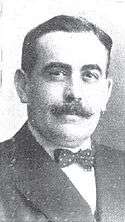 |
The Most Excellent Joaquín Chapaprieta (1871–1951) |
25 September 1935 |
14 December 1935 |
80 days | – Minister of Finance | Independent | Chapaprieta I (PRR–CEDA–PAE–LlC) | ||
| Chapaprieta II (PRR–CEDA–PAE–LlC) | |||||||||
| — | |||||||||
| The Straperlo and Nombela corruption scandals led to CEDA withdrawing support from the government and causing its fall. | |||||||||
 |
The Most Excellent Manuel Portela Valladares (1867–1952) |
14 December 1935 |
30 December 1935 |
67 days | – Minister of Governance | Independent | Portela I (PRR–LlC–PLD–PP) | ||
| 30 December 1935 |
19 February 1936 |
Portela II (Centr.–PP) | |||||||
| — | |||||||||
| Coup d'etat attempt on 17–18 February; Popular Front victory in the 1936 election. | |||||||||
 |
The Most Excellent Manuel Azaña (1880–1940) |
19 February 1936 |
10 May 1936 |
81 days | — | IR | Azaña IV (IR–UR) | ||
| 1936§ | |||||||||
| Elected to the post after the Popular Front victory. Amnesty Law releasing all involved in the 1934 events; restoration of the Generalitat de Catalunya; removal of Alcalá-Zamora as President of the Republic. Left the office to become new President. | |||||||||
 |
The Most Excellent Augusto Barcía Trelles (1881–1961) Acting Prime Minister |
10 May 1936 |
13 May 1936 |
3 days | – Minister of State | IR | (acting) (IR–UR) |
Manuel Azaña (1936–1939) | |
| — | |||||||||
| Served as Minister of State under Azaña and as acting Prime Minister following his resignation. | |||||||||
| |
The Most Excellent Santiago Casares Quiroga (1884–1950) |
13 May 1936 |
19 July 1936 |
67 days | – Minister of War | IR | Casares Quiroga (IR–UR–ERC) | ||
| — | |||||||||
| 1936 Galicia autonomy referendum and ratification of the 1936 Galician Statute of Autonomy (implementation aborted as a result of the Civil War outbreak). Political unrest leading to the killings of José Castillo and José Calvo Sotelo; Spanish coup of July 1936. Resigned after proving incapable of confronting the uprising. | |||||||||
| |
The Most Excellent Diego Martínez Barrio (1883–1962) |
19 July 1936 |
19 July 1936 |
0 days | — | UR | Martínez Barrio II (UR–IR–PNR–ERC) | ||
| — | |||||||||
| Never confirmed, took on the role as incumbent President of the Cortes; failed negotiation attempt with the Nationalists; Spanish Civil War outbreak. To date the shortest-serving Prime Minister. | |||||||||
 |
The Most Excellent José Giral (1879–1962) |
19 July 1936 |
4 September 1936 |
47 days | – Minister of the Navy | IR | Giral (IR–UR–ERC) | ||
| — | |||||||||
| Spanish Civil War: Non-Intervention Agreement and Committee by European powers (August 1936); massacrees of Badajoz and Modelo prison in Madrid; Siege of the Alcázar and Extremaduran and Gipuzkoa campaigns. Outbreak of Spanish Revolution of 1936. Resigned after the Fall of Talavera allowed the Nationalists to lay siege to Madrid. | |||||||||
.jpg) |
The Most Excellent Francisco Largo Caballero (1869–1946) |
4 September 1936 |
4 November 1936 |
255 days | – Minister of War | PSOE | Caballero I (PSOE–IR–PCE–UR–ERC–PNV) | ||
| 4 November 1936 |
17 May 1937 |
Caballero II (PSOE–CNT–IR–PCE–UR–ERC–PNV) | |||||||
| — | |||||||||
| 1936 Statute of Autonomy of the Basque Country; expropriation and nationalization of land. Spanish Civil War: Fernando Poo island revolt; 1936 Battle of Cape Spartel; International Brigades created; start of Siege of Madrid; the Republican government moves to Valencia on 7 November 1936; Battle of Ciudad Universitaria; Aceituna Campaign; Paracuellos and Málaga–Almería road massacres; Battles of Jarama and Guadalajara; start of Biscay Campaign and War in the North; Bombing of Guernica; 1937 May Days and end of Spanish Revolution. | |||||||||
 |
The Most Excellent Juan Negrín (1892–1956) |
17 May 1937 |
5 April 1938 |
1 year, 318 days | – Minister of Finance and Economy until 1938 – Minister of National Defence from 1938 |
PSOE | Negrín I (PSOE–IR–PCE–UR–ERC–PNV) | ||
| 5 April 1938 |
31 March 1939 |
Negrín II (PSOE–IR–PCE–UR–ERC–ANV–CNT –PSUC from 1938) | |||||||
| — | Diego Martínez Barrio (1939) Acting President | ||||||||
| Spanish Civil War: Fall of Bilbao; Battle of Brunete; Zaragoza Offensive; Sovereign Council of Asturias and León proclaimed; Asturias Offensive; Battles of Teruel and Cape Palos; Aragon and Levante Offensives; Thirteenth Points of Negrín; Battle of the Ebro; disbandment of the International Brigades; Catalonia Offensive; resignation of President Manuel Azaña on 27 February 1939; Segismundo Casado's coup d'etat and establishment of the National Defence Council under José Miaja on 5 March. Final offensive of the Spanish Civil War. | |||||||||
| No party National Movement | |||||||||
| Portrait | Name Honorifics & Constituency (Birth–Death) |
Term of office Electoral mandates |
Days (Years and days) |
Other ministerial offices held whilst Prime Minister |
Political party | Government | Head of State (Term) | ||
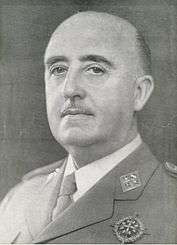 |
His Excellency Generalissimo Francisco Franco (1892–1975) |
Franco Dictatorship | 35 years, 131 days | – Caudillo | No party (Military/National Movement) |
Franco I | Francisco Franco (1936–1975) | ||
| 31 January 1938 |
11 June 1973 |
Franco II | |||||||
| Franco III | |||||||||
| Franco IV | |||||||||
| Franco V | |||||||||
| Franco VI | |||||||||
| Franco VII | |||||||||
| Franco VIII | |||||||||
| — | |||||||||
| Head of State and of Government within the Nationalist faction since 1 October 1936. Republican defeat in 1939 (end of Spanish Civil War); establishment of an autocratic one-party military dictatorship. White Terror; 1939–59 Spanish Autarky; Spanish Maquis; non-belligerency during the Second World War; Hendaye Meeting; nationalization of Spanish railways and creation of RENFE; signing of Anti-Comintern Pact; Begoña Bombing; Fundamental Laws of the Realm; Laurel Incident; Endesa founded; Spanish Question; beginning of the Cold War; 1947 law of succession referendum; Obligatory Old-Age and Disability Insurance (SOVI); Spain entry to the United Nations; Concordat of 1953; Pact of Madrid; TVE incorporated; independence of Morocco and Ifni War; Valle de los Caídos built; Stabilization Plan of 1959 and 1959–74 Spanish Miracle; ETA and FRAP are created (start of Basque conflict); 1962 Asturian miners' strike; Spanish Methanol Poisonings; Public Order Courts established; creation of social security system (Social Security Bases Law 1963 and General Social Security Law 1966); Palomares Incident; Press and Print Law 1966; 1966 organic law referendum; decolonization of Spanish Guinea; Eurovision Song Contest 1969; closure of Gibraltar–Spain border; Juan Carlos de Bourbon named Prince of Spain and Franco's heir apparent; Matesa affair; Burgos Trial of 1970; General Education Law 1970. | |||||||||
 |
The Most Excellent Luis Carrero Blanco (1904–1973) |
11 June 1973 |
20 December 1973† |
192 days | — | National Movement | Carrero Blanco | ||
| — | |||||||||
| 1973 Penal Code. †Assassinated by ETA members six months after taking office (last Prime Minister to die while in office). | |||||||||
_links_opvolger_Prins_Juan_Carlos_met_(cropped).jpg) |
The Most Excellent Torcuato Fernández-Miranda (1915–1980) Acting Prime Minister |
20 December 1973 |
29 December 1973 |
9 days | – Deputy Prime Minister – Minister-Secretary General of the Movement |
National Movement | (acting) | ||
| — | |||||||||
| Served as Deputy Prime Minister under Carrero Blanco and as acting Prime Minister following his assassination. | |||||||||
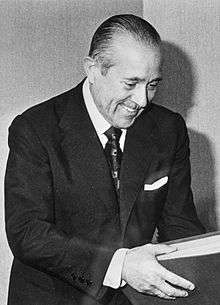 |
The Most Excellent Carlos Arias Navarro (1908–1989) |
29 December 1973 |
22 November 1975 |
1 year, 328 days | — | National Movement | Arias Navarro I | ||
| — | |||||||||
| Appointed to the office as a result of the assassination of Luis Carrero Blanco; served as interim until 3 January 1974. 1973–74 oil crisis; Spirit of 12 February; Carnation Revolution in Portugal; Military Democratic Union founded; garroting of Catalan anarchist Salvador Puig Antich; Cafetería Rolando bombing; launching of the PCE-led Democratic Junta and the PSOE-led Democratic Convergence Platform; last use of capital punishment in Spain; Green March and Madrid Accords ending Spanish presence in the Sahara. Death of Francisco Franco on 20 November 1975. | |||||||||
| National Movement UCD PSOE PP | |||||||||
| Portrait | Name Honorifics & Constituency (Birth–Death) |
Term of office Electoral mandates |
Days (Years and days) |
Other ministerial offices held whilst Prime Minister |
Political party | Government | Monarch (Reign) | ||
 |
The Most Excellent Carlos Arias Navarro (1908–1989) |
22 November 1975 |
1 July 1976 |
222 days | — | National Movement | Arias Navarro I | Juan Carlos I_(cropped).jpg) (1975–2014) | |
| Arias Navarro II | |||||||||
| — | |||||||||
| Confirmed by King Juan Carlos I after Franco's death. Vitoria and Montejurra massacres. Disagreements over political and democratic reform led to the King demanding his resignation, which he tendered. | |||||||||
.svg.png) |
The Most Excellent Fernando de Santiago (1910–1994) Acting Prime Minister |
1 July 1976 |
3 July 1976 |
2 days | – First Deputy Prime Minister for Defence Affairs | National Movement | (acting) | ||
| — | |||||||||
| Served as First Deputy Prime Minister for Defence Affairs under Arias Navarro and as acting Prime Minister following his resignation. | |||||||||
.jpg) |
The Most Excellent Adolfo Suárez (1932–2014) |
3 July 1976 |
4 July 1977 |
4 years, 237 days | — | National Movement | Suárez I | ||
| 4 July 1977 |
25 February 1981 |
UCD | Suárez II | ||||||
| Suárez III | |||||||||
| Appointed in 1976 by King Juan Carlos I after Arias Navarro's resignation. First Prime Minister appointed by a democratically elected parliament since the Second Republic. Spanish transition to democracy; 1976 political reform referendum; Political Reform Law 1977; Massacre of Atocha; PCE legalized; Amnesty Law 1977; Moncloa Pact; Spanish Constitution of 1978 adopted after its approval and ratification in referendum; Operation Galaxia; Spain–Holy See Agreements of 1979; first autonomy referenda in Andalusia, Basque Country, Catalonia and Galicia; Constitutional Court of Spain established; Alonsotegi bombing; 1979 energy crisis and early 1980s recession; unsuccessful 1980 vote of no confidence. Resignation announced on 29 January 1981, remaining in the post as a caretaker until Calvo-Sotelo's appointment. | |||||||||
.jpg) |
The Most Excellent Leopoldo Calvo-Sotelo (1926–2008) |
25 February 1981 |
2 December 1982 |
1 year, 280 days | — | UCD | Calvo-Sotelo | ||
| — | |||||||||
| Served as Second Deputy Prime Minister and Minister of Economic Affairs under Suárez in 1980–81, succeeding him after his resignation. 1981 failed coup d'état during investiture. Divorce legalized; Spain entry to NATO; toxic oil syndrome scandal; change of national flag; 1981 autonomic pacts; 1982 coup d'état attempt. | |||||||||
.jpg) |
The Most Excellent Felipe González (born 1942) |
2 December 1982 |
5 May 1996 |
13 years, 155 days | — | PSOE | González I | ||
| González II | |||||||||
| González III | |||||||||
| González IV | |||||||||
| Expropriation of Rumasa in 1983. Social security reforms leading to the establishment of a welfare state in Spain, including: 40-hour week, free and compulsory education and fixed-term contracts; decriminalization of abortion and creation of the National Health System. Reorganization of the Spanish Armed Forces to deal with military insurrectionism; industrial reconversion program; Flick affair; re-opening of Gibraltar–Spain border; 1985 El Descanso bombing; introduction of VAT; NATO membership referendum; Spain entry to the EEC; Plaza República Dominicana bombing; unsuccessful 1987 vote of no confidence; Hipercor bombing; Inheritance and Donation Taxes introduced; 1988 general strike; Collapse of Communism and dissolution of the USSR; legalization of private TV channels and temporary employment agencies; Education Law 1990 (LOGSE); Gulf War; ratification of the Maastricht Treaty; Barcelona 1992 Summer Olympics and Seville Expo '92; inauguration of AVE Madrid–Seville line; §Hung parliament; minority government reliant on CiU support. 1993 economic crisis; 1993 EEA Agreement; corruption scandals (Filesa, Luis Roldán, CESID espionage); 1994 general strike; Turbot War; pension system reform (1995 Toledo Pact); Corporate Tax introduced; 1995 Penal Code and abolition of the death penalty. Public outcry after the unveiling of GAL actions and withdrawal of CiU support led to the calling of a snap election in 1996, which was won by the PP. | |||||||||
.jpg) |
The Most Excellent José María Aznar (born 1953) |
5 May 1996 |
17 April 2004 |
7 years, 348 days | — | PP | Aznar I | ||
| Aznar II | |||||||||
| §Hung parliament; minority government reliant on CiU (Majestic Agreement) and CC support, initially including the PNV. Killing of Miguel Ángel Blanco and subsequent public outcry (Spirit of Ermua); privatization of many previously government-owned industries (Telefónica, Repsol YPF, Endesa and Tabacalera); 1997 economic boom; Doñana disaster; Land Law 1998; Non-Residents Income Tax introduced; 1998–99 ETA's ceasefire declaration; introduction of the euro; NATO bombing of Yugoslavia; Civil Procedure Law 2000; compulsory military service abolished; Immigration Law 2000; 2000–01 Mad Cow disease outbreak; 2001 Organic Law on Universities; 11 September attacks and support of US War in Afghanistan; National Hydrological Plan; Political Parties Law 2002 and banning of Batasuna; cuts in unemployment benefits resulting in a general strike in 2002; Perejil Island crisis; Prestige oil spill and Nunca Máis movement; Education Law 2002 (LOCE); Bush–Aznar memo; 2003 Iraq War and subsequent protests; Yak-42 air flight accident; 2004 Madrid train bombings. | |||||||||
.jpg) |
The Most Excellent José Luis Rodríguez Zapatero (born 1960) |
17 April 2004 |
21 December 2011 |
7 years, 248 days | — | PSOE | Zapatero I | ||
| Zapatero II | |||||||||
| §Hung parliaments. Spanish forces leave Iraq in 2004; social reforms (Gender Violence and Dependent Care Laws; same-sex marriage legalized); European Constitution referendum; Ibarretxe Plan; 2006 ETA's ceasefire and Madrid–Barajas Airport bombing; 2006–07 Statute of Autonomy reforms and new Catalonia Statute; Marbella City Council dissolution; Education Law 2006 (LOE); 2007 diplomatic conflicts with Venezuela and Morocco; ratification of the Lisbon Treaty; Historical Memory Law; Iñaki de Juana Chaos hunger strike and release; financial crisis of 2008–11; 2008 transport strike; Expo 2008; 2009 flu pandemic; 2009 Alakrana attack; retirement age increased to 67; labour market reform of 2010 and subsequent general strike; reform of abortion to a deadline-based scheme; "state of alarm" declared during the 2010 air traffic controllers strike; military intervention in Libya (Operation Unified Protector); 15-M anti-austerity movement; 2011 constitutional reform on budgetary stability; ETA's permanent ceasefire declaration and end of Basque conflict. | |||||||||
.jpg) |
The Most Excellent Mariano Rajoy (born 1955) |
21 December 2011 |
Incumbent | 5 years, 238 days | — | PP | Rajoy I | ||
| Rajoy II | Felipe VI.jpg) (2014–present) | ||||||||
| 2012 labour market reform; budget cuts to public services (health and education); 2012 Asturian miners' strike; partial nationalization of Bankia, banking system crisis and bailout; start of Catalan sovereigntist process; 2012 general strikes; Parot doctrine repealed by the European Court of Human Rights; PP corruption scandals (Bárcenas affair, Púnica, Lezo); Santiago de Compostela derailment; Education Law 2013 (LOMCE); Islamic terrorism in Europe; abdication of Juan Carlos I; 2014 Ebola disease outbreak; 2014 Catalan self-determination referendum; Citizen Security Law 2015 (Gag Law); introduction of life imprisonment; Podemos and C's surge. §Hung parliaments; his second government was allowed by PSOE's abstention after 315 days in caretaker capacity. Gürtel case trial; ETA's disarmament; Banco Santander rescue of Banco Popular Español; unsuccessful 2017 vote of no confidence. | |||||||||
Timeline

See also
- Prime Minister of Spain
- List of Spanish monarchs
- List of heads of state of Spain
- President of the Republic (Spain)
- List of Spanish regents
This article is issued from
Wikipedia.
The text is licensed under Creative Commons - Attribution - Sharealike.
Additional terms may apply for the media files.